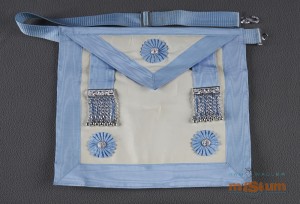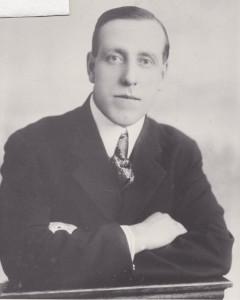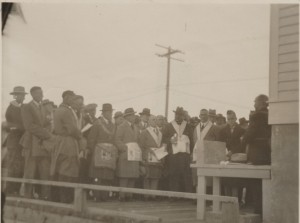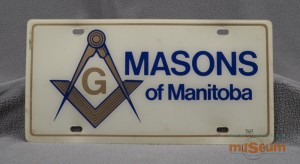Freemasons
While the origins of the Masons are unknown, the Order of the Free Masons as we know it started around the 1600s in the United Kingdom when stone masons began meeting to regulate their trade. From this beginning, their meetings developed into ritualized ceremonies where new members participated in an initiation process. Organized Freemasonry originated June 24, 1717 when four London Lodges joined and formed themselves into a Grand Lodge.
The Pas’ Masonic history began in the fall of 1913 when a group of men met and decided to found a Masonic Lodge in The Pas. It wasn’t until the following year on February 13, 1914, that W.H. Bunting, Henry F. Bickle, and R.W. Taylor formed a committee to begin inquiries for a meeting place. On February 20, 1914, a meeting was held at the Bickle & Brown insurance offices to elect the principal officers of the Lodge and decide on a meeting location based on information gathered by the committee that had met the week previous.
The following men were elected at this meeting:
Henry H. Elliot as Worshipful Master
William H. Bunting as Senior Warden
Orley H. Finger as Junior Warden
Members of The Pas Lodge decided that meetings would be held at Sclaney Hall until a more permanent location could be found. Shortly after that, they decided to secure land, possibly from Christ Church Anglican on the Saskatchewan River, or somewhere else to build a hall; possibly the Anglican Church could build a hall that the Lodge could then rent.
On April 23, 1914, Grand Master E. M. Walker of the Grand Lodge of Manitoba granted The Pas Lodge the permission to organise until the next Communication of the Grand Lodge when a constitution could be granted. Members of The Pas Lodge proceeded to meet on March 1, 1914, to elect a full slate of officers as follows:
Henry H. Elliot as Worshipful Master
William H. Bunting as Senior Warden
Orley H. Finger as Junior Warden
George H. Taylor as Treasurer
Glen A. Cameron as Secretary
Henry F. Bickle as Senior Deacon
George Brown as Junior Deacon
Downey Duncan as Senior Steward
George H. McLelland as Junior Steward
David Hunter as Director of Ceremonies
John P. Jackobsen and Lewis Matheson Tyler in other positions
The following year, on June 10, 1915, The Pas Lodge was officially chartered as Lodge No. 124. The following members are noted at the time of chartering:
J.H. Dempsey
R.S. Orok
L. Mathieson
R.W. Taylor
J.M. Wanless
B.M. Stitt
J.A. Gilland
Henry H. Elliot
William H. Bunting
Orley H. Finger
George H. Taylor
Glen A. Cameron
Henry F. Bickle
George Brown
Downey Duncan
George H. McLelland
David Hunter
John P. Jackobsen
For the following 12 years, Lodge No. 124 leased or rented space, including Sclaney Hall.
It wasn’t until July 19, 1927, that the sod turning ceremony for the first dedicated Masonic Hall occurred. The hall was located on the northwest side of Fischer Avenue between Byng Street and 1st Street West. In 1960, the land and building were sold separately with the building being moved to the south end of town. Construction of the next Masonic Hall, located at 145 LaRose Avenue, finished in 1961, with the first meeting held on October 5 of that year. Forty-four years later, in 2005, a new hall was dedicated on April 15. The hall, located at 214 Edwards Avenue, is the current home of The Pas Masonic Lodge.
The Pas Lodge has provided for its members and the larger community over the years. Social gatherings for members and their families were common, including picnics at Clearwater Lake just north of The Pas. Currently, members provide assistance when a need becomes apparent, such as the Meals on Wheels program in The Pas. Members are also expected to provide monetary assistance to causes. This is part of the over $1.4 million dollars a day that is donated in North America to individuals who are in need.
Over the years, the membership has risen and fallen in The Pas Lodge. The club started with 18 charter members, with membership rising to well over 100 in the late 1970s and early 1980s. While membership is currently steady at about 32 members in The Pas, membership awareness campaigns are going strong throughout the world to educate the public and encourage new members. Membership itself cannot be solicited by Masons as each new member must approach a Lodge or current member of his free will.
The Masons will continue to be part of The Pas for some time to come. Their recognition of community needs and the work of their members play a vital role in the area.
Philosophy
However, Masons are not a service organisation per se. The fraternity is based on the belief that each member has the responsibility to help make the world a better place for everyone. Freemasonry encourages good men to become better men. This is done by promoting a life dedicated to benevolence, community service and higher ideals. While an emphasis is placed on religion, for most Masonic Lodges there is no requirement beyond that. All faiths and religious beliefs are accepted. As a result, each member can use his own beliefs for guidance while becoming a better man. In fact, politics and religion are two topics that are not allowed to be discussed during Masonic meetings.
Text produced by Sam Waller Museum staff.





